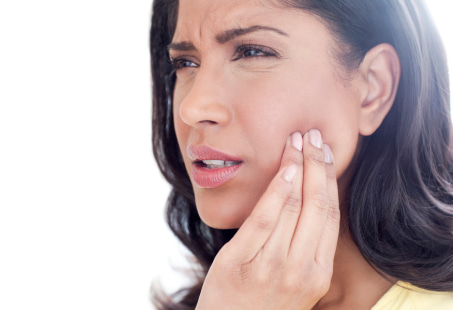A sore jaw can be quite discomforting and might even make it difficult for you to chew your food normally. From bruxism to trauma and arthritis, there are a number of reasons why your jaw may feel this way.
In this guide, you’ll learn more about the possible causes of a sore jaw, how long the problem may last, and what you can do to get rid of it.
What Causes A Sore Jaw?
Some of the causes of a sore jaw are as follows:
Teeth Grinding (Bruxism)
Teeth grinding is a movement disorder which is characterised by the grinding, clenching and gnashing of the teeth. The causes of this condition are varied, such as malocclusion (bad bite), health problems (e.g. sleep apnea, Parkinson’s, dementia), certain drugs and medications (e.g. anticonvulsants, SSRIs), genetics, and anxious personality.
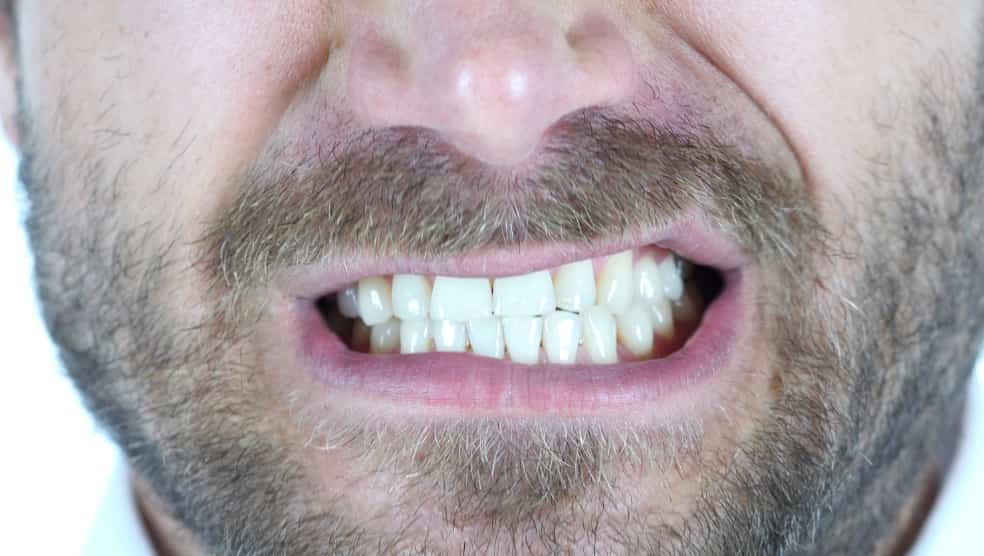
According to a study published in the International Journal of Environmental Research and Public Health, the bite force of an average individual is 7801.8 kg/s per day. In contrast, it is 26126.92 kg/s per day (more than 3 times) for a person who has bruxism. It leads to a host of problems, some of which are chipping, enamel fracture, receding gums, pain, hypersensitivity, TMJ, and sore muscles of the jaw.
Temporomandibular Joint Disorder (TMJ)
The temporomandibular joint is what connects the lower jawbone (mandible) “to the bone at the side of the head” (temporal bone), and considering its wide range of motion (up, down and sides), it’s quite flexible, as reported by the National Institute of Dental and Craniofacial Research (NIDCR). It also has muscles around it, helping with its “position and movement.”
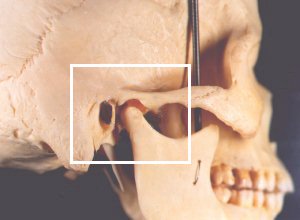
It’s both the muscles and the joint itself that are affected by TMJ disorders (it’s a group of conditions). The causes of TMJ disorders can be anything from bruxism, malocclusion, wearing, and arthritis to stress and injury of the jaw.
Pain, clicking, popping sounds from jaw movement, locking jaw, difficult/painful chewing of food, headache, ringing in the ears, stiff jaw and the soreness of the muscles of the jaw are a few of the signs and symptoms of this condition.
Arthritis
Arthritis is a condition of the joints that’s commonly associated with old age. It’s an umbrella term used to describe over 100 conditions that can result in pain, stiffness, swelling, tenderness and inflammation of the joints. Therefore, this is another condition that might leave with you a sore jaw.
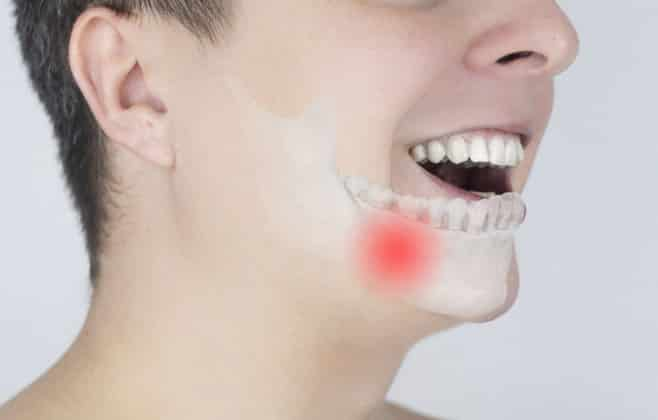
Rheumatoid arthritis is a type of arthritis which is the result of an autoimmune disease – when the immune system malfunctions and abnormally starts damaging the body’s own joints. And according to a 2014 study published in Case Reports in Dentistry, the TMJ is one of the joints that is affected in rheumatoid arthritis. In fact, more than 50% of the patients have shown its involvement. By damaging the “soft, spongy cartilage” that helps in the smooth movement of the jaw, it can leave it stiff and sore, as per WebMD.
Working Out The Muscles
If you work out the muscles of your jaw a little too much, that might also leave it sore. For instance, things like gum chewing, mewing, or even oil pulling might cause this problem.
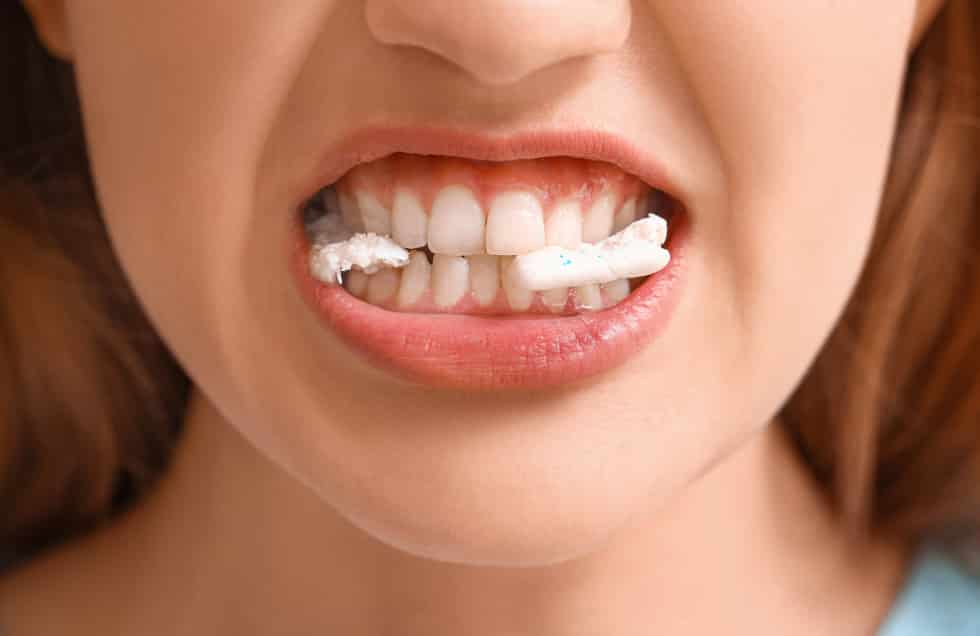
Certain activities might increase the risk of problems that can affect your jaw more seriously. A 2014 study published in the Journal of Craniofacial Surgery reported that chewing gum for a long period of time “may increase the prevalence of temporomandibular disorders. (TMD)” And TMD has also been reported to make the jaw sore.
Trauma
Problems with the jaw joint can also occur if you’ve experienced some kind of traumatic injury there, such as a bad fall or an accident. Resultantly, one of the things you might experience is soreness. The same might happen if you experience trauma from a dental procedure, such as having your wisdom tooth extracted.
Why Is Your Jaw Sore On One Side?
There can be different reasons as to why your jaw might be feeling sore on one side. For instance, TMJ is the kind of condition that can be unilateral or bilateral, meaning it can affect one or both sides, so it may be the reason behind the soreness of your jaw on one side.
An injury or surgery on one side of the face might be another, however, you must get yourself checked by your dentist for an accurate diagnosis and effective treatment plan.
How To Get Rid Of A Sore Jaw?
The treatment for a sore jaw will depend on the underlying cause of the problem. Therefore, only your dentist can best guide you on this.

In the case of bruxism, the treatments may include the wearing of a mouth guard, Botox, muscle relaxants, therapies for reducing stress (e.g. cognitive behavioural therapy, meditation), behaviour change, and repair of the teeth that have been damaged, possibly through restorations like dental crowns.
For TMJ, treatments might also include mouth guards, muscle relaxants, Botox, and behavioural changes. But you might also be recommended NSAIDs (non-steroidal anti-inflammatory drugs), antidepressants, physical therapy, counselling or even surgery. It will depend on your case.
Additionally, you might also be advised to stick to softer foods, apply heat or cold packs, and avoid worsening the problem by chewing gum or grinding teeth, among other things.
For rheumatoid arthritis as well, your dentist might recommend that you have a soft diet, use a mouthguard, and apply compresses. Although the treatment for this condition itself usually includes medications like disease-modifying antirheumatic drugs (DMARDs), NSAIDs, biologic agents, steroids, JAK inhibitors, etc.
How Long Does A Sore Jaw Last?
How long your jaw remains sore can also depend on what’s making it so in the first place. It may be short or long-term. For instance, if it’s TMJ, Cleveland Clinic states, that sometimes it goes away after 1-2 weeks, but when it’s more severe, it can last for months to years.
The longevity of bruxism will depend on what’s causing it, but you may have this for years as well. However, if it’s due to something very temporary, like the extraction of a wisdom tooth, your jaw might feel sore for a week or so.
Conclusion
A sore jaw is not something that should be taken so lightly. Although not always, it can be indicative of a deeper problem and can be accompanied by more distressing symptoms, which can affect your normal functioning.
Depending on the underlying cause, a sore jaw might only be temporary, but it might also stay with you for a much longer time. Therefore, it’s best to get in touch with a dentist as soon as possible for a proper diagnosis and treatment plan.
Reviewed and approved by Dr Izbel Aksit
FAQ
Can a sore jaw cause ear pain?
Sore jaw and ear pain might co-occur as a part of another health problem. For instance, both bruxism and temporomandibular joint disorders might cause pain in the ears and sore jaw.
Can coughing make your jaw sore?
It may be possible for coughing to make your jaw sore as a result of repetitive and forceful movements, however, you must get yourself checked by your dentist.
How long is the jaw sore after tooth extraction?
Your jaw might feel sore for a week or so after your tooth extraction. However, if you feel something isn’t right and your symptoms are getting worse, you should inform your dentist immediately.
Is a sore jaw a sign of a heart attack?
According to MedlinePlus, pain resulting from a heart attack can travel to your jaw and teeth. Therefore, jaw pain is considered one of the symptoms of a heart attack.
Should you be worried about your sore jaw?
A sore jaw can result from serious issues like a traumatic injury or rheumatoid arthritis. Even when it’s the result of a condition like bruxism, early intervention can be very important in protecting your teeth in the long run. Therefore, if you’re experiencing this problem, make sure you talk to a dentist.
